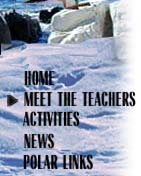
|
|
19 January, 2000
Hello All,
Yesterday during lunch time, 12:45 pm to be exact, we were treated to an
avant guarde concert from from Ghent, Belgium. It was carried via
satellite to Palmer and piped through the "All Call" system for all to
enjoy. The station stood perfectly still for this 15 minute musical gift.
It was such an interesting mix of voices, coupled with the flute,
clarinet, and viola. A loud applause errupted afterwards! Only in
Antarctica, I thought.
After a productive morning in the lab, I spent the afternoon with the
"sound guys," Doug Quin and Steve Dunbar. Polly Penhale, and Jim LoScalzo
and I went with them to Cormorant Island so Doug and Steve could record
new sounds of the cormorant chicks as they develop. Jim went off to
photograph penguins. I set up the camera to take a digital panoramic of
the island. I am hoping it will be posted soon for you to enjoy. While I
was shooting, I made a mental note to watch out for the pair of renegade
skuas famous for dive bombing visitors. With pictures collected, sounds
recorded, and great vistas enjoyed, it was time to leave. The water was
unusually calm. There was virtually no wind. It was a wonderful day to be
out in the boat. As we puttered back towards station, Polly spotted a
whale and Doug decided to drop his microphone into the water to try and
pickup whale sounds. As we sat there in the stillness, a leopard seal
shot up from the calm water right next to the boat, looking straight at
us. It startled all of us! These animals have reputation for being quite
intelligent and aggressive. Each one of us moved away from the edge of
the boat and huddled near the center. Nervous and excited we watched as
the leopard seal swam around and curiously studied us. It was a beautiful
animal. Very sleek and stealth. A couple of penguins (leopard seal bait)
were stranded on a clump of rocks away from shore. They were all too aware
of this predator's presence. I heard people tell stories of leopard seals
that would jump into a boat while in pursuit of a pengui!!.
We continued to head back to station, excited by what we saw! As we
passed by Torgersen Island we spotted 3 or 4 leopard seals scanning the
shore, looking for penguin dinner. Two seals spotted our boat and were
interested. One in parcticular followed us all the way around the island.
At one point we thought it might follow us to station! It was very
exciting to see such a beautiful, strong, graceful, predator swim 6 feet
from you!!
Back at the ranch..... After dinner, it was my night to GASH! In other
words, clean the kitchen. At 6:30 the music is cranked up and the gashing
begins. At 7:30 everyone bee lined it to the lounge for a science talk by
Bill Fraser. Bill is the Chief Scientist at Palmer Station and his work
on the Adelie penguin population over the last 20 some odd years has been
incredible. He has seen first hand and has long-term data sets that
support the impact of climate change on the Adelie penguins. Climate
warming trends have impacted the penguins by the decrease in sea ice. Sea
ice is home to algae that feeds krill larvae, Without the sea ice, krill
populations diminish. A decrease in krill means a decrease in the major
food source for penguins. To complicate matters for the penguins, it seems
that the nesting habitat they select is equally important to their
breeding success. For example, on Torgersen Island, site of a major Adelie
rookery in the Peninsula, the north and south island colonies fare very
differently. The south side of the island receives more snow deposits and
therefore, it is harder for penguins to nest and lay their eggs. This
seems to delay the hatching time for some of the chicks. To a penguin,
getting a late start in Antarctica can mean the difference between living
and dying. It is found that bigger chicks stand a better chance of making
it to breed. Smaller chicks, ie: those hatched late, have the odds stacked
against them. The krill population peeks in January in this area. By
February, the numbers fall off. If you are a weak, low weight, penguin
chick having to feed in February, chances are you won't make it. Seems
like a sad scenario, doesn't it?
After the science talk and discussion it was time for bed. Another great
day at the bottom of the world!
Until tomorrow,
Mimi
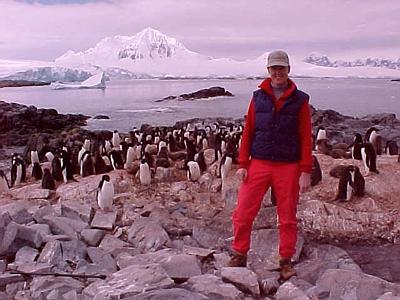
Here I am on Cormorant Island at one the Adelie penguin rookeries.
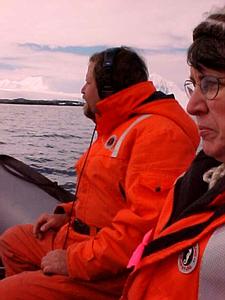
Doug Quin listening for whale songs.
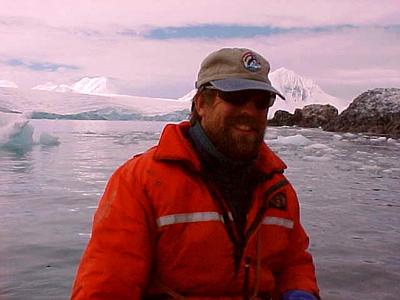
Steve Dunbar navigated the zodiac to very "interesting" sites!
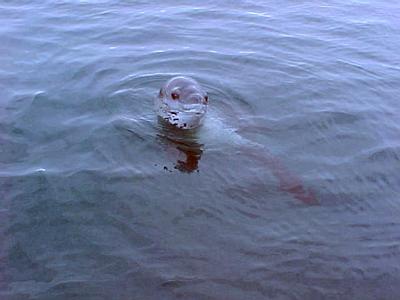
Unfortunately, this isn't a great picture of a leopard seal, but it is a leopard seal nonetheless. This fellow was very curious about us.
Contact the TEA in the field at
.
If you cannot connect through your browser, copy the
TEA's e-mail address in the "To:" line of
your favorite e-mail package.
|
